Search the Special Collections and Archives Portal
Search Results
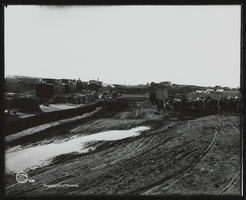
Shipping Ore at Tonopah: photograph
Date
Archival Collection
Description
Image
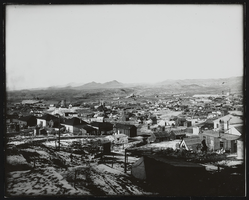
Tonopah, Nevada: photograph
Date
Archival Collection
Description
Image
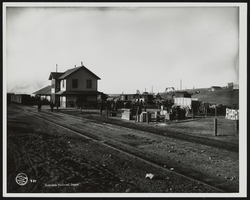
Tonopah Railroad Depot: photograph
Date
Archival Collection
Description
Image
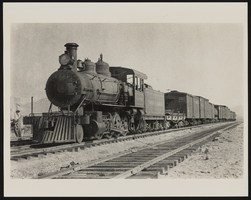
Midway Ore Station at Tonopah and Tidewater: photograph
Date
Archival Collection
Description
Image
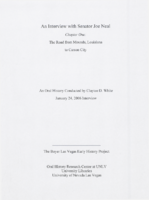
Transcript of first interview with Senator Joe Neal by Claytee D. White, January 24, 2006
Date
Archival Collection
Description
First interview in a series of five with Nevada State Senator Joe Neal conducted by Claytee D. White on January 24, 2006. Born in Mounds, Louisiana, in 1935, Neal joined his family in Las Vegas as a young man shortly before serving in the United States Air Force from 1954 to 1958. Following his military service, he earned a bachelor's degree in political science at Southern University in Baton Rouge, Louisiana. Neal continued his education at the Institute of Applied Science in Chicago, Illinois, with postgraduate work in law. From 1973 to 2001, he served in the Nevada Legislature as the Senator from Clark County Senatorial District No. 4. In the first interview, Neal recalls his childhood, moving to Las Vegas as a teenager, and joining the Air Force. He discusses his early experiences in politics and his involvement in various issues.
Text
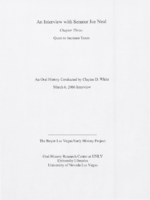
Transcript of third interview with Senator Joe Neal by Claytee D. White, March 3, 2006
Date
Archival Collection
Description
Third interview in a series of five with Nevada State Senator Joe Neal conducted by Claytee D. White on March 3, 2006. Born in Mounds, Louisiana, in 1935, Neal joined his family in Las Vegas as a young man shortly before serving in the United States Air Force from 1954 to 1958. Following his military service, he earned a bachelor's degree in political science at Southern University in Baton Rouge, Louisiana. Neal continued his education at the Institute of Applied Science in Chicago, Illinois, with postgraduate work in law. From 1973 to 2001, he served in the Nevada Legislature as the Senator from Clark County Senatorial District No. 4. In the third interview, Neal shares details of his service to Nevada. He recalls legislation enacted to achieve integration of the hotels and unions, his efforts to increase state taxes on the gaming industry, and his successful campaign strategies. Neal also relates the history of the Economic Opportunity Board in Nevada and predicts the outcome of the 2006 gubernatorial race.
Text
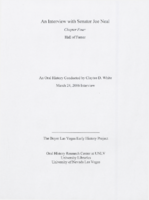
Transcript of fourth interview with Senator Joe Neal by Claytee D. White, March 24, 2006
Date
Archival Collection
Description
Fourth interview in a series of five with Nevada State Senator Joe Neal conducted by Claytee D. White on March 24, 2006. Born in Mounds, Louisiana, in 1935, Neal joined his family in Las Vegas as a young man shortly before serving in the United States Air Force from 1954 to 1958. Following his military service, he earned a bachelor's degree in political science at Southern University in Baton Rouge, Louisiana. Neal continued his education at the Institute of Applied Science in Chicago, Illinois, with postgraduate work in law. From 1973 to 2001, he served in the Nevada Legislature as the Senator from Clark County Senatorial District No. 4. In the fourth interview, Neal shares opinions on capital punishment, southern Nevada utility ownership, the ethics and political influence of the gaming industry, high hospital costs, and the bailout of the Economic Opportunity Board, among other issues. He comments on his induction into the Nevada State Senate Hall of Fame and reviews changes in Las Vegas over the years, particularly in education. Neal closes with thoughts on the future of downtown Las Vegas and the potential impact of planned renovations and high-rise buildings on the Westside.
Text
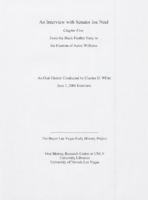
Transcript of fifth interview with Senator Joe Neal by Claytee D. White, June 1, 2006
Date
Archival Collection
Description
Fifth interview in a series of five with Nevada State Senator Joe Neal conducted by Claytee D. White on June 1, 2006. Born in Mounds, Louisiana, in 1935, Neal joined his family in Las Vegas as a young man shortly before serving in the United States Air Force from 1954 to 1958. Following his military service, he earned a bachelor's degree in political science at Southern University in Baton Rouge, Louisiana. Neal continued his education at the Institute of Applied Science in Chicago, Illinois, with postgraduate work in law. From 1973 to 2001, he served in the Nevada Legislature as the Senator from Clark County Senatorial District No. 4. In the fifth interview, Neal recalls the rise of the Black Panther Party and the atmosphere of fear when Patty Hearst was kidnapped by the Symbionese Liberation Army. In closing, Neal relates that voting machines were impounded to protect votes for Aaron Williams, the first black elected to the city council of North Las Vegas, and shares memories of Judge Mendoza.
Text

Transcript of interview with Elaine Cali McNamara by Claytee White and Stefani Evans, October 5, 2016
Date
Archival Collection
Description
This ability to greet each day with a challenge has laid the foundation for a long history of success for Elaine McNamara as she has navigated through local beauty pageants, an illustrious real estate career, serving on the Las Vegas-Clark County Library board during their decade of expansion to authorship. Her story of resilience starts when she became ill at approximately seven or eight with erythema nodosum that impeded her ability to walk for five months when she started collecting pictures of movie stars. Her favorite movies were any of Roy Rogers, Abbott and Costello, Dean Martin and Jerry Lewis. Her family moved to Las Vegas, where she attended Las Vegas High School as well as UNLV majoring in elementary education and minoring in language arts. While she attended high school, she studied modeling in the evenings to help overcome her shyness and to become more outgoing. Becoming more involved with local and state beauty pageants, she met the likes of Phyllis Diller, Natalie Wood,
Text
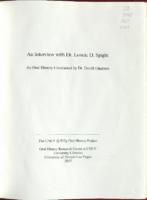
Transcript of interview with Dr. Lonnie D. Spight by Dr. David Emerson, May 8, 2007
Date
Archival Collection
Description
Text
